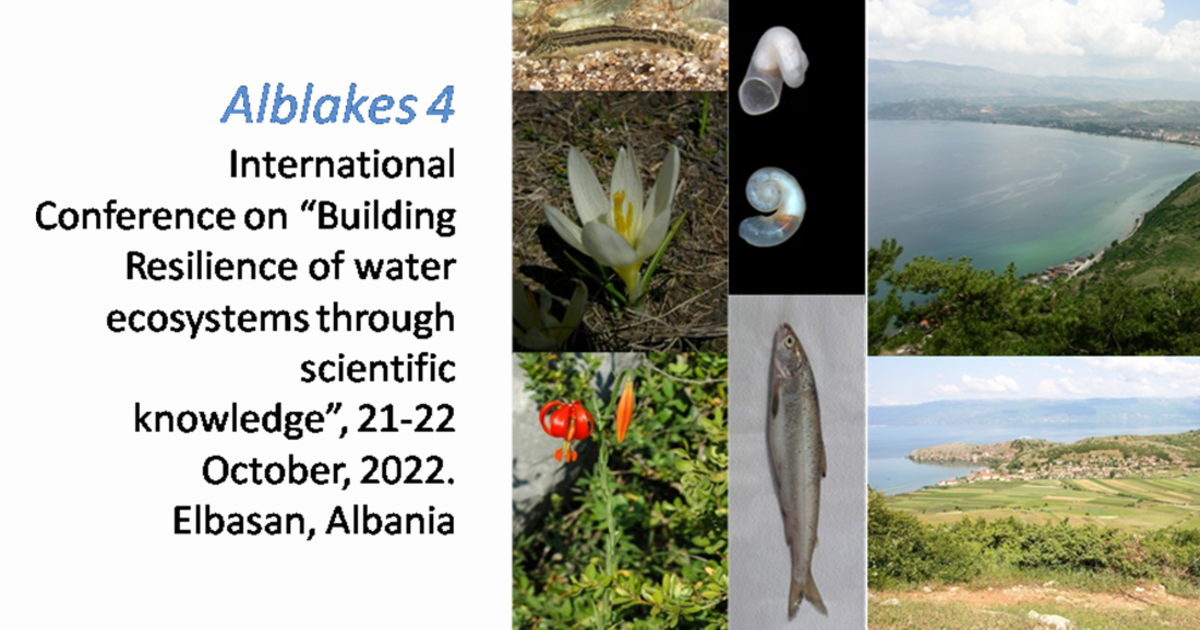- 3.7CiteScore
- 31 daysTime to First Decision
Building Resilience of Water Ecosystems through Scientific Knowledge
Special Issue Information
Dear Colleagues,
The Alblakes 4—International Conference on “Building Resilience of Water Ecosystems through Scientific Knowledge” will be held from 21 to 22 October 2022 in Elbasan, Albania. The event will bring together a large panel of scientists, policy makers, practitioners and researchers from a variety of geographical regions to discuss and exchange research on water ecosystems at the local, national, regional and international levels. Alblakes 4 will discuss how the scientific community can best support the implementation of adaptation and mitigation measures to climate changes and building the resilience of aquatic ecosystems, habitats and species. Furthermore, there will be a special session dedicated to the assessment and conservation of the Vjosa River’s biodiversity.
The following list covers some of the topics to be presented at Alblakes 4 in 2022. Papers on other subjects related to the objectives of the conference will also be considered.
- Understanding the disaster risk to water ecosystems, habitats and associated species;
- Water ecology, species and habitats diversity: What is their threshold?
- Ecosystem resilience vs. society resilience;
- Biodiversity and alien species;
- Environmental pollution and eutrophication;
- Plant diversity and rehabilitation function;
- Adaptive and resilient design of water infrastructure: water quality, flooding and drought;
- Environmental Impact Assessment;
- Water resources and ecology services for climate change;
- Assessment and conservation approaches to the biodiversity of the Vjosa River;
- Building awareness and trust among communities, inclusive decision making on future climate risks and ecosystem processes.
Prof. Dr. Genuario Belmonte
Prof. Dr. Sotir Mali
Dr. Spase Shumka
Guest Editors
Manuscript Submission Information
Manuscripts should be submitted online at www.mdpi.com by registering and logging in to this website. Once you are registered, click here to go to the submission form. Manuscripts can be submitted until the deadline. All submissions that pass pre-check are peer-reviewed. Accepted papers will be published continuously in the journal (as soon as accepted) and will be listed together on the special issue website. Research articles, review articles as well as short communications are invited. For planned papers, a title and short abstract (about 250 words) can be sent to the Editorial Office for assessment.
Submitted manuscripts should not have been published previously, nor be under consideration for publication elsewhere (except conference proceedings papers). All manuscripts are thoroughly refereed through a single-blind peer-review process. A guide for authors and other relevant information for submission of manuscripts is available on the Instructions for Authors page. Hydrobiology is an international peer-reviewed open access quarterly journal published by MDPI.
Please visit the Instructions for Authors page before submitting a manuscript. The Article Processing Charge (APC) for publication in this open access journal is 1000 CHF (Swiss Francs). Submitted papers should be well formatted and use good English. Authors may use MDPI's English editing service prior to publication or during author revisions.
Keywords
- water ecology
- resilience of aquatic ecosystem
- alien species
- species and habitats diversity
- eutrophication
- climate changes
- conservation approach
- community-based knowledge
- environmental pollution
- ecosystem degradation
- water basin decision making
- recovery of ecosystems

Benefits of Publishing in a Special Issue
- Ease of navigation: Grouping papers by topic helps scholars navigate broad scope journals more efficiently.
- Greater discoverability: Special Issues support the reach and impact of scientific research. Articles in Special Issues are more discoverable and cited more frequently.
- Expansion of research network: Special Issues facilitate connections among authors, fostering scientific collaborations.
- External promotion: Articles in Special Issues are often promoted through the journal's social media, increasing their visibility.
- e-Book format: Special Issues with more than 10 articles can be published as dedicated e-books, ensuring wide and rapid dissemination.

